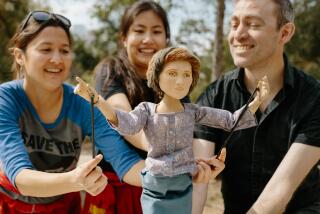Burr Tillstrom, Creator of TV’s ‘Kukla, Fran and Ollie,’ Dies
- Share via
Television pioneer Burr Tillstrom, who with ad-libs and hand-held puppets created “Kukla, Fran and Ollie,” a children’s show that was a prime-time hit throughout much of the 1950s, was found dead Friday at his Palm Springs home. He was 68.
Riverside County coroner’s officials said a maid discovered Tillstrom’s body in a chair beside his swimming pool, and it appeared he had succumbed to natural causes.
“He was an artist, somebody very special,” said Frances Allison, an actress who was hostess on the show and, as the only live performer, provided straight lines for a bulb-nosed clown named Kukla, a one-toothed dragon called Ollie and other puppet characters.
“Kukla, Fran and Ollie” was a staple of early television, broadcast five nights a week from 1948 through 1952 on NBC and, after a one-year interruption, resuming for three more years on ABC. The show was always done live, with no rehearsals and no scripts.
Tillstrom was to have been inducted into the Television Academy Hall of Fame in a televised banquet March 23.
Born in Chicago to parents he said had theatrical talent themselves, Tillstrom showed an early instinct for puppeteering and show business.
“As a child,” he once said, “I always tried to mimic performances and movies I saw with small figures, stuffed teddy bears, dolls, anything I could make move.”
Later, Tillstrom dropped out of the University of Chicago to take a job with the WPA Federal Theater’s Marionette Project. He made his first performing puppet in 1936. It was Kukla. The clown was christened by Russian ballerina Tamara Toumanova, who was charmed by Tillstrom’s creation when he showed it to her backstage. “Kukla” means doll in Russian.
Puppet Show Appeared at ’40 World’s Fair
In 1939, Tillstrom toured with RCA, demonstrating the new-fangled television. His puppet show was broadcast as an exhibit at the 1940 World’s Fair in New York City.
In 1947, on his 30th birthday, the television show that would evolve into “Kukla, Fran and Ollie” debuted on a Chicago station. Tillstrom recalled signing on with the station in a 1953 interview:
“I went home and broke out in a cold sweat, trying to figure how I would fill an hour a day,” he told an interviewer. “I called Fran, whom I had met several weeks prior, and asked her to join the troupe. She said she’d try it and then I sat down and wrote out 10 ideas.
“Of course, when the show began we started ad-libbing and we’ve never used a script since.”
Within two years, the show was being broadcast nationally and it eventually garnered three Emmy and two Peabody awards for Tillstrom.
His cast of puppet characters, the Kuklapolitan Players, included Kukla, the solemn clown; Oliver J. Dragon, or Ollie; Fletcher Rabbit, the mailman with droopy ears; Ophelia Oglepuss, an ex-opera star; Beulah Witch, who rode a jet-powered broomstick, and several others.
Tillstrom made all the puppets by hand, and did all the voices.
The show was brought back on public television from 1969 to 1971 and was rebroadcast in a syndicated version during 1975-76.
Allison recalled Friday night that there always seemed to be a magical chemistry at work between her and Tillstrom.
“We would think about things and just develop as time went along,” she said. “I would think to myself, ‘I wish this or that character would say something,’ and no sooner would I think it then one of the puppets would say it. He (Tillstrom) in turn would think, ‘I wish she would act or say this or that,’ and I would say it.”
Tillstrom had kept active until his death, holding seminars and writing a fairy tale, and engaging in other special projects. He said two years ago: “You never retire from thinking. I can’t keep my mind still. Nothing has changed. I don’t think people in the arts ever retire. How can a painter turn off an idea?”
Said his only brother and sole survivor, Richard: “If he lived to be 100 years old, he probably would still be creating something. His shop was always busy.”
Richard Tillstrom said funeral services would be private.
More to Read
The complete guide to home viewing
Get Screen Gab for everything about the TV shows and streaming movies everyone’s talking about.
You may occasionally receive promotional content from the Los Angeles Times.







